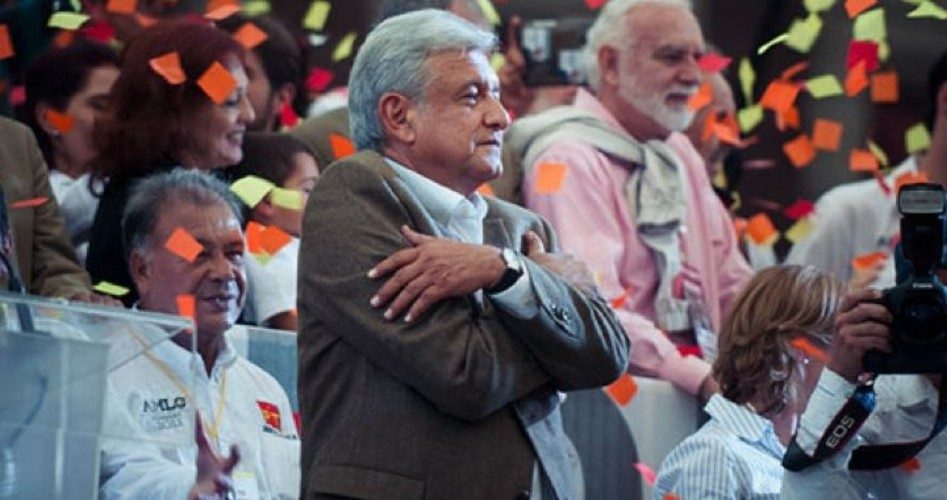
The junior partner in the new trade agreement between the United States, Canada, and Mexico has christened the pact.
Though repeatedly and commonly referred to as the US-Mexico-Canada Agreement, or USMCA, Mexico’s new hard-left president, Andrés Manuel López Obrador, also known as AMLO, has another name.
Apropos of his Twitter poll about what the agreement ought to be called, he says its name will be T-MEC, or “Tratado México-Estados Unidos-Canadá” which translates as the Mexico-United States-Canada Treaty.
And that last word, as The New American reported last week, is no minor point. Is it a treaty or an agreement?
Whatever the answer, America First Policies, a group set up to support Trump and his America First agenda, has pushed out an advertisement to back the agreement — or treaty, if you’re the man called AMLO.
Mexico Claims Top Billing
Lopez Obrador renamed the trade pact after he asked his 4.5 million followers on Twitter what it should be called.
As AFP reported, the Mexican president-elect, who starts his new job on December 1, required “something pronounceable” for the name.
The poll “delivered a clear preference for T-MEC,” Lopez Obrador tweeted yesterday.
The three choices were TEUMECA (Tratado Estados Unidos México Canadá, or United States-Mexico-Canada Treaty), T-MEC (Tratado México Estados Unidos Canadá, or Mexico-United States-Canda Treaty), or other. Not surprisingly, patriotic Mexicans went with the second choice, which received 45 percent of the 102,000 votes cast, AFP reported. Putting the United States first received 16 percent, and a whopping 39 percent voted for “none of the above.”
Reported AFP, “The showdown over the name has pitted López Obrador’s often-mocked fondness for putting thorny issues to a vote against Trump’s also-mocked fondness for renaming things.”
Hilariously, “Trump has reportedly even given López Obrador a new nickname, calling him ‘Juan Trump’ an apparent reference to their rough similarities,” including skepticism about free trade.
Pro-Trump Group Backs It
America First Policies, a pro-Trump group that spent a fortune to help push through the confirmation of U.S. Supreme Court Associate Justice Brett Kavanaugh, recently released an ad backing the trade deal.
It says the pact is “a better deal for American farmers, a new dawn for American automakers, [and offers] stronger protections for American innovators and American workers.”
The ad features Trump’s claim that “this new deal will be the most modern, up-to-date and balanced trade agreement in the history of the country.”
“Thanks to President Trump,” the narrator intones, “America is winning again.”
AFP’s website says it “believes in expanding trade in ways that are fairer for all Americans.”
All actions with regard to trade should seek to enforce U.S. trade laws; promote economic growth and job creation in the United States and reciprocity with our trade partners; strengthen our manufacturing base and our national security; leverage American economic strength to expand our agricultural and services industry exports; and protect U.S. intellectual property rights. To accomplish these goals, the United States must focus on bilateral rather than multilateral negotiations — and revise any trade agreements that aren’t protecting the interests of our American workers, farmers, ranchers, and businesses in global markets. By fighting for fair and balanced trade deals, we can bring jobs back to America’s shores, increase wages, and support U.S. manufacturing.
The website presents data relative to American trade, including the important detail that “in 2016, we imported nearly $750 billion more in goods than we exported.”
The question is whether this agreement does what AFP’s website says it does, and whether it means “America is winning again.’
Globalist Authors
As The New American has reported, the plan, hatched by the same globalists who controlled trade policy in the past, is hardly an America First policy, however much it fiddles with the disastrous NAFTA and TPP agreements.
USMCA confers the power to regulate trade on such global bodies as the World Trade Organization, International Labor Organization, and the United Nations, via such conventions including the Law of Sea treaty, over U.S. trade policy.
It creates a veritable maze of committees to manage agriculture, transportation, financial services, telecommunications, and intellectual property rights. The globalist bureacrats in charge can alter the agreement, including tariffs, without the consent of Congress, which is unconstitutional. The Constitution gives Congress the responsbility to regulate trade.
The pact would also further entangle the economies of the three signatories under the guise of “integration.”
Beyond all that, if it is, as López Obrador says, a treaty, which it is because it’s an agreement between two or more nations — the very definition of a treaty — then it requires the Senate ratification, not merely the president’s OK.
Photo of AMLO: Eneas De Troya



